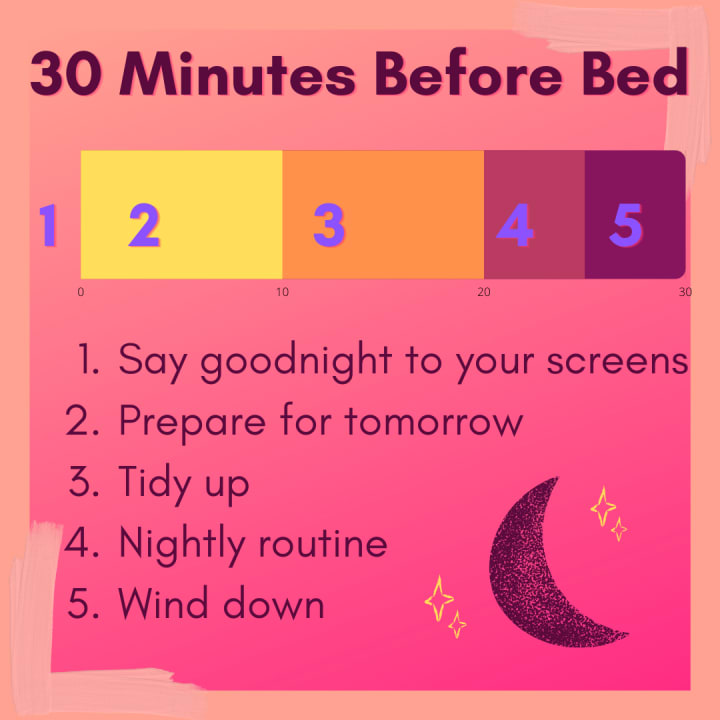30 Minutes Before Bed: A Lifehack
How to transform and improve your life with just 30 minutes a day

Picture this: You're on the couch, casually scrolling on your phone, Netflix playing in the background when you suddenly realize it's after 11pm. You jump up, get ready for bed, check your phone one last time and then slip under your sheets. You've made a New Years Resolution to get a full eight hours of sleep and 7am is looming.

If this is at all familiar, you're on the right track! You might think that you're getting enough sleep, but the truth is hours in bed aren't enough if you’re not actually hitting your REM cycles.
Instead of focusing only on the hours in bed, consider improving the quality of sleep. Try purposefully utilizing the 30 minutes before bed to see real, positive changes in your well-being.
Cleaner spaces? Check ✔️
Calmer mornings? Check ✔️
Better quality sleep? Check ✔️
Sounds magical, right? Nope, it’s science!
The Science of Sleep
Sleep is absolutely critical for our overall health. Adults need between 7 and 9 hours of sleep a night, with between 3-5 REM cycles (when mental restoration and learning occurs). The Sleep Foundation states:
An insufficient amount of sleep can lead to serious repercussions. Some studies have shown sleep deprivation leaves people vulnerable to attention lapses, reduced cognition, delayed reactions, and mood shifts.
Not all sleep is created equal, but there are steps that can be taken to help improve sleep hygiene and transition to a more sleep-receptive state. If you’ve spent nights tossing and turning, you aren’t getting the quality of sleep that you need. It’s even possible that you’ve become accustomed to living with a low-level of sleep deprivation because inadequate sleep feels normal.
Screens Negatively Impact Sleep Quality
Screens are one of the biggest obstacles to high-quality sleep. It’s habitual to watch TV, phone in hand, and check social media feeds right before bed. This has multiple negative consequences:
Your mind is stimulated - information, entertainment or comments that are upsetting can serve to keep your mind working when it should be resting.

Light from screens impacts melatonin - melatonin is the hormone released by your body at night to help maintain your circadian rhythm. Blue light has the same effect as daylight, making your body believe you should be awake.
Notifications can cause a rush-like feeling - notifications on your phone can cause a release of dopamine in the same way that slot machines do. This puts your body in a state of heightened urgency and can even cause anxiety, counteracting attempts to rest.
30 Minutes Before Bed
Sleep experts recommend turning off all screens at least 30 minutes prior to bed to mitigate those negative consequences. Good advice, but who wants to sit around and wait 30 minutes before going to bed?
Instead, choose to purposefully use those 30 minutes. Seize the opportunity to spend time without a screen, allowing your brain to decompress, and intentionally utilize that half an hour to improve your whole life. You don't need to adjust your bedtime, you’ll significantly improve sleep quality, feel more rested and prepared for the next day. Here’s the breakdown in five steps:

Step 1: Say Goodnight to Your Screens
Whether you’re watching TV, gaming or just checking your phone, when you feel ready to head to bed, it’s time to power them down. Most phones have a ‘sleep mode’ or 'do not disturb' setting these days to facilitate sleeping by turning off notifications. It’s there for your benefit, use it!

Once you’ve done your final social media and email checks, put your phone wherever you typically leave it at night. Don't keep it with you, think of this as the same step you would normally do just before you get into bed, just 30 minutes earlier. If you use your phone as an alarm clock, make sure that you put it face down so you aren’t tempted to check it again.
This has to be the first step that you take. Remember, if you check your phone again before you’re ready to sleep, you will undo the good you accomplished for your brain and your sleep.
Bonus Tip #1 - Streaming television has changed the way we consume shows, so why shouldn’t it change the way you watch them, too? Episodes typically end with a cliff-hangar or a hook to get you to keep watching. Beat the lure by pausing partway through the show at a low point in the story arc. If you’re enjoying the show, you'll keep watching another day. This way, you avoid the “just one more episode” trap.
Step 2: Prepare for Tomorrow - 10 Minutes
Now that your phone is down and your screens are off, it's time to take advantage of your 30 minutes. Use the first third to help your future self by getting set for the next day.
Choose your outfit - It can be frustrating to realize the shirt you wanted to wear is dirty or being unable to find your favourite jeans. Lay out your clothes for tomorrow and you won’t need to think or worry about it in the morning.
Pack your lunch - This doesn’t just save time in the morning, this can help you save money and make healthy eating choices. Ensure that your whole lunch is ready to go so that all you have to do is grab the bag out of the fridge.

Gather your gear - If you’re going to school, pack your backpack with your homework and books. If you’re headed to work, make sure everything you need is ready by the door. Is your travel coffee mug clean? Now is the best time to check!
Bonus Tip #2 - If you have leftovers from dinner, divide them into smaller, lunch-sized containers right away. This makes them easy to grab and means you’ll be less likely to throw away uneaten food.
Step 3: Tidy Up - 10 Minutes
Spending 10 minutes a day cleaning can help to reduce anxiety. This is not intended to be a deep clean and you shouldn't feel like you need to finish. Tidying up is a necessity of life, why not tackle small chunks at a time?

Doing a little every day will add up to make a big difference in your home, and helps with your mental health! Choose one chore or watch the clock to accomplish as much as you can in 10 minutes.
The Clean Sink - An empty sink can leave you with a positive feeling of accomplishment. Dirty dishes? Load the dishwasher or do a quick wash. Choosing to mindfully wash dishes can leave you feeling less stressed.
Fold Laundry - Marie Kondo’s Netflix show introduced us to her KonMari Method and taught us a smart way to fold laundry. There is a remarkably therapeutic aspect to folding! If you have a large load of clean clothes, there's nothing wrong with spreading it out over a few evenings.
Tidy Your Entranceway - Hang up coats, put shoes on racks, put hats and gloves where they’re supposed to go. A home’s entrance can very easily seem cluttered, causing stress. It’s the first impression you have when you return home after a long day. A neat entranceway can feel even more welcoming.
Bonus Tip #3 - The 30 minute screen-free night routine works great for teens, too! If you have kids that like to sleep in, this helps improve their sleep and greatly reduces the panic and pandemonium of a rushed morning.
Step 4: Nightly Routine - 5 Minutes
Don’t forget to take time for your own bedtime routine! This part of your day signals your brain that you’re getting ready to go to sleep. A consistent routine is an integral component of healthy sleep habits.

Brush your teeth and wash your face, take advantage of this time to ensure you're following your skincare routine.
Change out of your clothes and into comfortable pjs (or whatever you like to sleep in!)
Do you floss every night or brush your hair right before bed? Whatever your nightly routine is, keep it consistent, even on the weekends!
Step 5: Wind Down - 5 Minutes
Wrap up your day by taking a few minutes to unwind. This is the very last thing you do before climbing into bed and turning out the light. Try any (or all!) of the below or choose your own favourite relaxation technique.

Meditation - meditation is an incredibly effective tool to help you relax. The evening, right before falling asleep, is an optimum time to try mindfulness meditation:
You can practice mindfulness meditation by simply closing your eyes and allowing yourself to focus on your thoughts and feelings. Observe your thoughts, but don’t judge them.
Journaling - If you’ve ever thought about keeping a journal, dedicating a few minutes every night is a good way to start. If a journal seems daunting, try taking a few minutes to write out a to-do list for the next day.
Stretching - Gentle stretching just feels good! If you already do yoga, do a few gentle poses before bed. If yoga isn't your thing, try Progressive Muscle Relaxation (PMR) to help relieve tension. Taking a few minutes to stretch every night will have long-term benefits.
Reading - Grab a book and escape for a bit! If 5 minutes of reading doesn't feel like enough time to you, simply plan to start your nightly routine a bit earlier so you have more time to enjoy your book and still get enough restful sleep.

Bonus Tip #4 - If you’ve been lying in bed, trying to fall asleep for 15-25 minutes, you’re not doing yourself any favours. This might seem counterintuitive, but stop trying! Instead, get up out of bed and do something. Keep the lights dim and avoid screens. A few minutes of reading, meditation, puzzles, laundry folding, etc. will help to tire you out so you can fall asleep.
Use Your 30 Minutes Purposefully
This breakdown of the 30 minutes is a suggested starting point. Try these activities and find out what works best for you. Some may prefer to spend more time on skincare and less time on lunches, others might really enjoy a longer gentle yoga session. Remember, 30 minutes is only the minimum recommended time! There’s nothing wrong with going screen-free even longer.
When you start purposefully utilizing your 30 minutes before bed you will see a positive shift in your overall health. You will help your brain go through a daily detox from screens, meaning that your sleep is of a higher quality. You will awake feeling more rested.

You will be prepared for the day because of intentional actions taken the night before. The smaller portions of tidying that you’ve done will add up, leaving you with more time and less worry over chores. You may even reduce stress and anxiety through a winding down routine. Like promised, it will feel a bit like magic!
Changing the way you use the last 30 minutes before bed can make a tremendous improvement in your life!

Sleep hygiene is important to remember when considering your overall health. If you'd like to know more ways to help improve your sleep, check out these tips from the Sleep Foundation.
If you enjoyed this article, please considering leaving a ❤️ ! - Christina B
About the Creator
Christina Blanchette
Hello! My day job is spent working as an engineer, I am a mom of 6, avid reader and part-time creator.






Comments
There are no comments for this story
Be the first to respond and start the conversation.